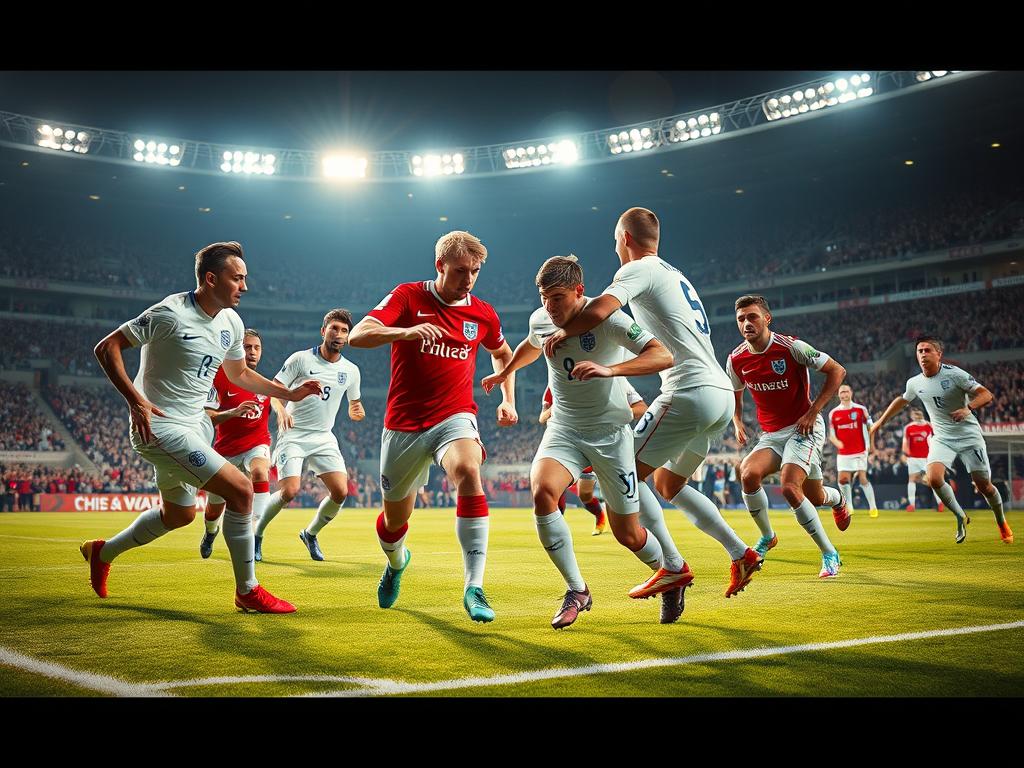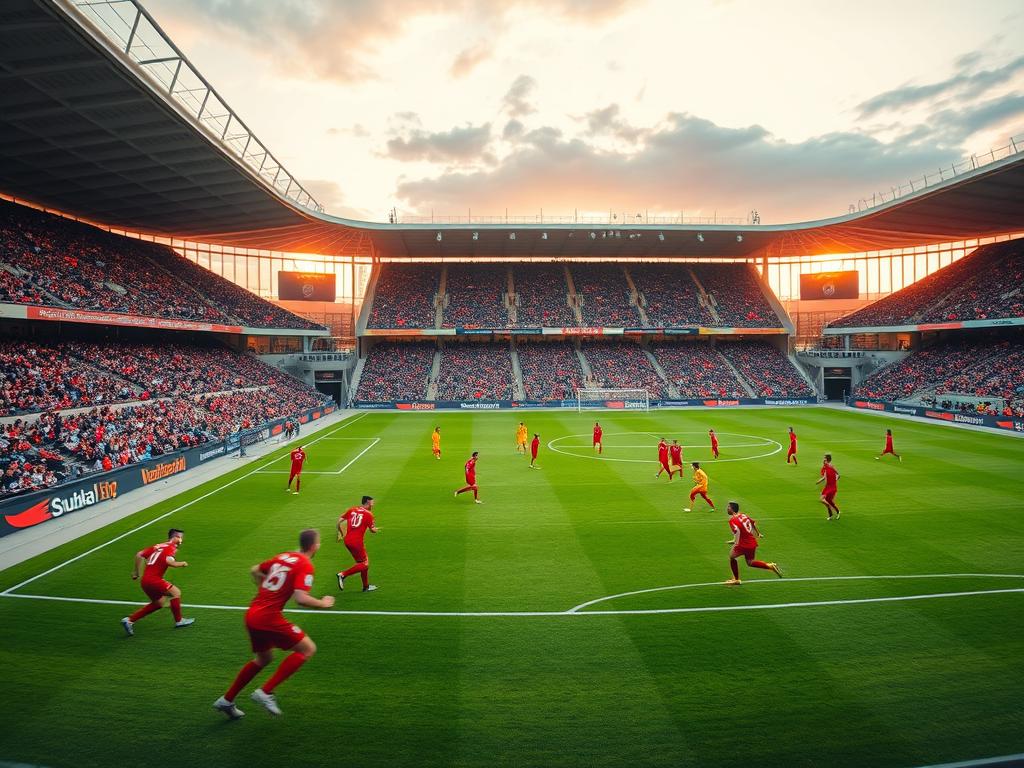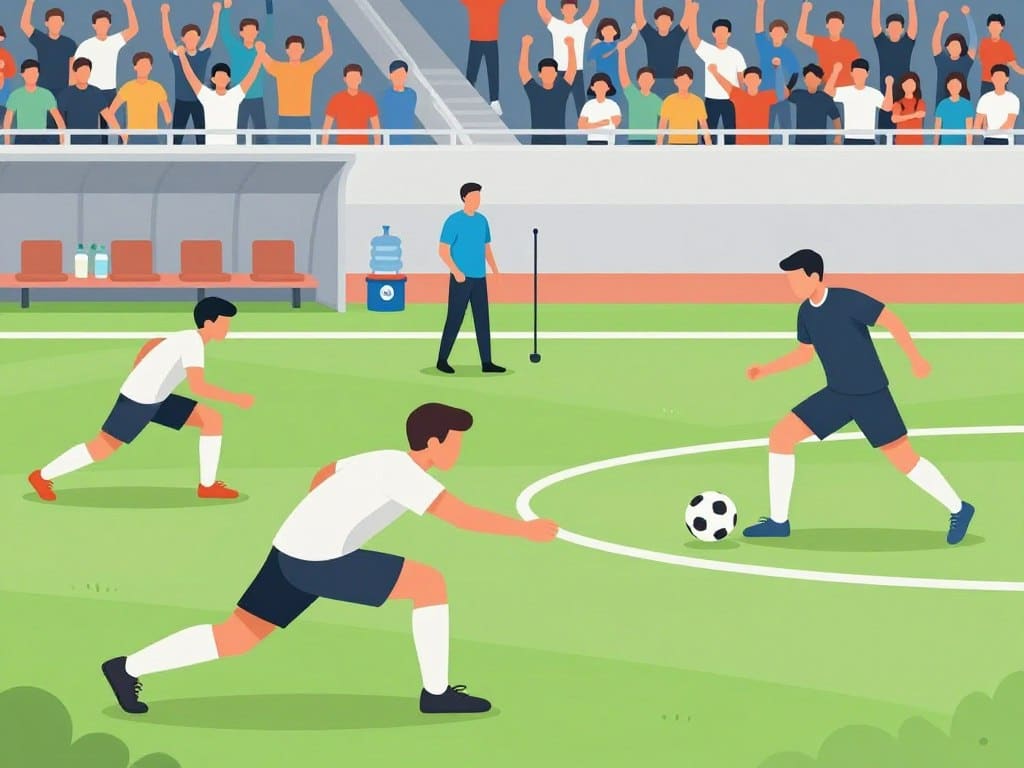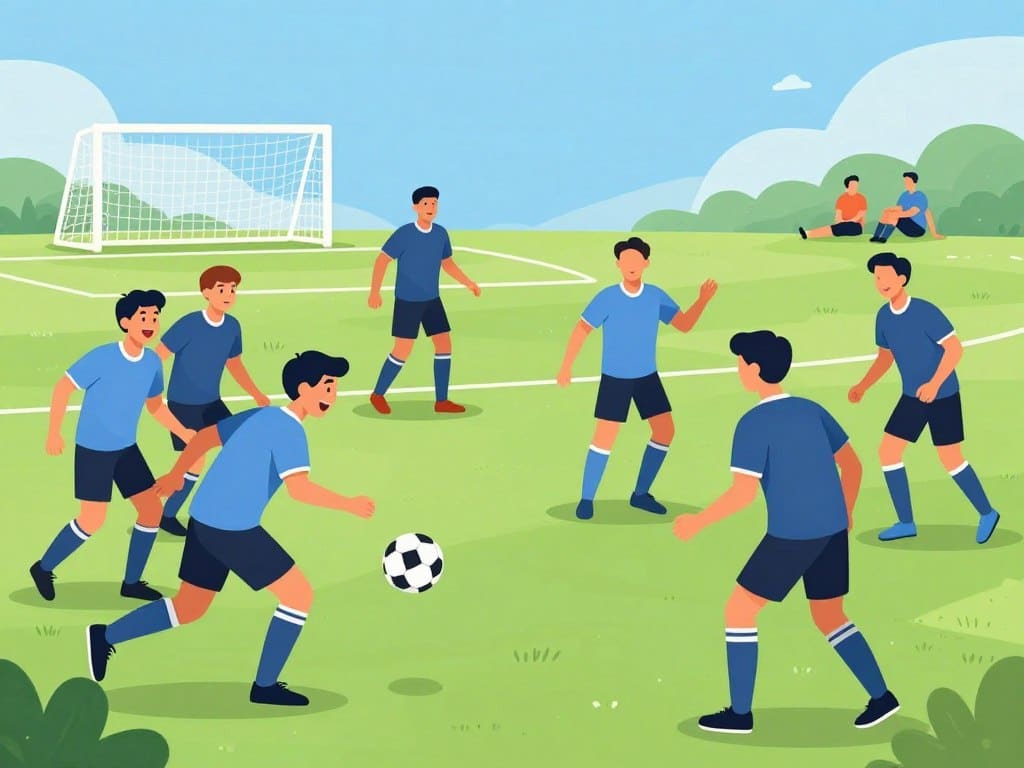Did you know the England national football team has played over 1,000 matches since 1872? That’s more than a century of thrilling goals, heart-stopping moments, and unforgettable drama on the pitch.
From the iconic 1966 FIFA World Cup win to modern-day battles in the Euros, this squad has shaped football history. Their journey is packed with highs, lows, and legendary players who’ve left their mark.
In this guide, we’ll break down their biggest tournaments, key stats, and stories every fan should know. Whether you’re a longtime supporter or new to the game, get ready for an exciting ride through football’s past and present.
Introduction: England’s Legacy in International Soccer
The world’s first international match marked the birth of a football giant. On November 30, 1872, England faced Scotland in a historic 0-0 draw. This first match set the stage for a legacy that would shape modern international football.
The Birth of the Three Lions
The Three Lions quickly became a force. By 1884, they dominated the British Home Championship, winning it 54 times over a century. Their amateur squad even claimed Olympic gold twice (1900, 1908).
Yet, England missed the first three World Cups due to FIFA disputes. After rejoining post-WWII, their 1966 triumph rewrote expectations forever.
Why England’s Tournament History Matters
From that England first game to global tournaments, their journey mirrors football’s evolution. Early British dominance influenced tactics worldwide. The 1966 win? It’s the benchmark every squad chases.
Get ready to uncover how humble beginnings built a football empire. The story of the Three Lions is the story of the beautiful game itself.
The Early Years: Football Origins (1870-1950)
Victorian-era matches laid the groundwork for what would become a football powerhouse. Picture this: cricket grounds packed with fans watching the first match between England and Scotland. No fancy stadiums—just raw passion and leather balls.
Kicking Off: Unofficial Matches and Dominance
Before FIFA or World Cups, England tested their skills in 5 unofficial games against Scotland. By 1884, they ruled the British Home Championship, winning 54 times. Crowds loved their attacking style, though tactics were simpler back then.
FIFA Feuds and Missed Opportunities
England boycotted the first three football tournaments due to fights over amateur pay. After rejoining FIFA post-WWII, their 1950 debut stunned the world—a 1-0 loss to the USA. Newspapers called it the “Miracle on Grass,” proving global competition had arrived.
- 1870s: Experimental matches on cricket pitches.
- 1928: FIFA exit over amateur rules.
- 1950: Shock loss to the U.S. in Brazil.
These early years weren’t just about wins. They shaped how England approached the game—sometimes the hard way.
1950-1966: From Humiliation to Glory
Few eras in football history packed as much drama as England’s journey from 1950 to 1966. It began with a shocking low—the world cup 1950 loss to the USA—and ended with their crowning moment. Along the way, tactical revolutions and unforgettable matches reshaped the sport.
The 1950 World Cup Debacle
Picture this: a squad dubbed “Kings of Football” losing to part-timers. In Brazil, England crashed out in the group stage after a 1-0 defeat. Newspapers called it the “Miracle on Grass.” Fans back home refused to believe the score was real.
Hungary’s Lesson: The 6-3 Defeat
Three years later, Hungary handed England their first time home loss to a non-UK team. The 6-3 thrashing exposed outdated tactics. Goalkeeper Gil Merrick conceded six, while Ferenc Puskás ran circles around defenders.
Road to 1966: Alf Ramsey’s Revolution
Enter Alf Ramsey. Appointed in 1963, he scrapped traditional wingers, creating the “Wingless Wonders.” His prediction? Victory against West Germany in the england world cup. Players like Bobby Charlton and Gordon Banks became household names.
- 1953: Hungary’s 6-3 win forced tactical overhauls.
- 1963: Ramsey’s appointment marked a new era.
- 1966: His “golden generation” proved doubters wrong.
1966 World Cup: England’s Finest Hour
Wembley Stadium erupted as history was made on July 30, 1966—a day forever etched in football lore. The Three Lions faced West Germany before 96,924 roaring fans in the FIFA World Cup final. What followed wasn’t just a match, but a cultural earthquake that still shakes English football today.
The “Wingless Wonders” Tactics
Manager Alf Ramsey gambled by ditching traditional wingers, packing midfield with workhorses like Nobby Stiles. His 4-3-3 formation—dubbed the “Wingless Wonders”—overwhelmed opponents with relentless pressure. This revolutionary approach neutralized stars like Franz Beckenbauer, proving tactics could trump individual brilliance.
Geoff Hurst’s Hat-Trick and Controversial Goals
Picture this: extra time, 2-2 scoreline, when Hurst’s shot hits the crossbar—did it cross the line? Modern tech suggests no, but the goal stood, making his hat-trick the only one in a world cup final. His third goal, a thunderous strike, sealed the 4-2 victory as fans stormed the pitch.
Legacy of the 1966 Triumph
No England team achievement since 1966 has matched its impact. The win birthed modern football culture—pubs packed for matches, kids emulating Bobby Moore’s tackles. Yet it also created impossible expectations, with every squad compared to Ramsey’s legends. That golden summer remains both inspiration and burden for the Three Lions.
1970s: Near Misses and Qualification Struggles
Mexico’s scorching heat wasn’t the only thing burning England’s hopes in 1970. The decade that followed their World Cup triumph became a story of shattered dreams and painful lessons. From dramatic collapses to shocking eliminations, this era tested fans’ loyalty like never before.
The 1970 Heartbreak Against West Germany
Picture this: a 2-0 lead against West Germany evaporating in León’s afternoon sun. With Gordon Banks sidelined by food poisoning, backup Peter Bonetti conceded three second-half goals. Franz Beckenbauer’s West Germany staged a comeback that still haunts supporters today.
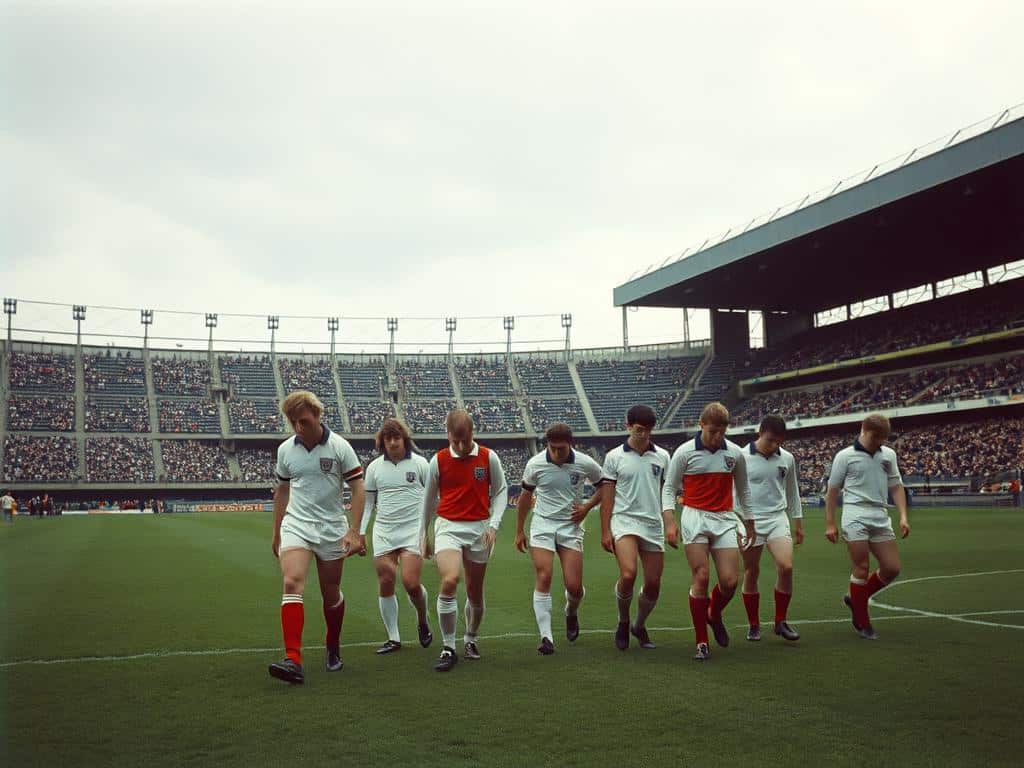
Qualification Nightmares
The 1974 campaign brought new lows. Needing a win against Poland, England faced goalkeeper Jan Tomaszewski—dubbed a “clown” by pundits. He became the hero with stunning saves, causing England’s first failed qualify attempt since 1938.
Four years later, history repeated. A group stage loss to Italy sealed another failed qualify scenario. These back-to-back misses exposed tactical stagnation and a growing gap from 1966’s heroes.
Key factors in England’s decline:
- Overreliance on 1966 veterans aging past their prime
- Don Revie’s controversial short-lived management
- European teams adopting more flexible formations
- Failure to develop creative midfield replacements
This turbulent decade proved that past glory guarantees nothing. The road to the second round of major tournaments became unexpectedly steep for the once-dominant side.
1980s: Maradona’s “Hand of God” and Redemption
Few matches in football history stir emotions like England’s 1986 clash with Argentina. This decade saw the Three Lions oscillate between heartbreak and hope, from controversial calls to heroic comebacks. We’ll relive the moments that defined an era.
1982 World Cup: Unbeaten but Eliminated
Spain hosted England’s first World Cup campaign in 12 years. Ron Greenwood’s squad went undefeated, yet failed to reach the second round. A 0-0 draw with Germany and two scoreless matches left fans frustrated.
1986: Diego Maradona’s Infamous Match
Mexico ’86 delivered the ultimate drama. Diego Maradona’s Hand of God goal—a blatant handball—put Argentina ahead. Minutes later, his solo wonder goal sealed England’s fate. Gary Lineker’s tournament-leading six strikes couldn’t prevent quarter-final exit.
1990: Gazza’s Tears and Semi-Final Run
Italia ’90 revived English spirits. Paul Gascoigne’s dazzling skills and yellow-card tears in extra time against West Germany made him an icon. The penalty shoot-out loss marked England’s best run since 1966, changing fan culture forever.
Key moments that shaped the era:
- Lineker’s Golden Boot performance in 1986
- First-ever penalty shoot-out defeat in 1990
- Maradona’s Hand of God becoming football folklore
- Gascoigne’s emergence as a cult hero
The 1990s: Euro 96 and the “Golden Generation”
Electric energy filled Wembley Stadium as England hosted its biggest football party in decades. Euro 1996 wasn’t just a tournament—it was a cultural reset. For the first time since 1966, fans dared to believe the Three Lions could conquer Europe.
Euro 1996: Football Comes Home
Terry Venables’ squad dominated the group stage, capped by a 4-1 demolition of the Netherlands. Alan Shearer’s clinical finishes and Paul Gascoigne’s magic had Wembley rocking. That iconic goal against Scotland—Gazza’s flick and volley—still gives fans chills.
The Shearer-Sheringham strike partnership terrorized defenses. Their telepathic understanding produced 7 combined goals. Venables’ 4-4-2 with overlapping fullbacks became the blueprint for modern English tactics.
Penalty Shootout Heartbreak Against Germany
Semi-final night at Wembley remains etched in pain. After a 1-1 draw, Gareth Southgate’s saved spot-kick sent Germany through. That penalty shoot-out loss birthed England’s dreaded “curse” from 12 yards.
Yet Euro 96’s legacy endures:
- “Football’s Coming Home” became the unofficial national anthem
- Pubs overflowed with fans singing the Lightning Seeds’ hit
- Southgate’s moment of despair later inspired his managerial resilience
For 30 days in 1996, England fell in love with football all over again. The heartbreak couldn’t dim the hope that finally, after decades, the game was coming home.
2000s: Sven-Göran Eriksson and the “Golden Generation”
Fans still debate whether the Golden Generation underachieved or simply faced tougher competition. With stars like Beckham, Lampard, and Gerrard, expectations soared—but trophies stayed just out of reach.
2002 and 2006 World Cup Quarter-Finals
Picture this: Brazil’s Ronaldinho lobbing Seaman from 40 yards in 2002. England’s world cup dreams ended there, despite a second round rout of Denmark. Four years later, Cristiano Ronaldo’s wink after Rooney’s red card sealed another exit.
The 2006 campaign was overshadowed by off-field drama. Tabloids obsessed over the “WAGs” in Baden-Baden, while Eriksson’s squad struggled to balance flair and discipline.
Euro 2004: Rooney’s Breakout Tournament
At just 18, Wayne Rooney terrorized defenses at the UEFA European Championship. His four goals made him the tournament’s youngest scorer—until injury cut his run short in the quarters.
Key moments that defined the era:
- Beckham’s redemption: His last-minute free kick against Greece (2001) secured World Cup qualification.
- Midfield clash: Lampard and Gerrard’s overlapping roles left gaps opponents exploited.
- Later under Fabio Capello, stricter tactics failed to fix the curse of the quarters.
The 2000s teased greatness but left fans wondering: was it bad luck, or did the hype outweigh the results?
2010s: Rebuilding and New Hope
The 2010s brought fresh energy to the Three Lions, mixing heartbreak with historic breakthroughs. From controversial calls to waistcoat-wearing managers, this decade proved England could thrill and disappoint in equal measure.
2010 World Cup: Lampard’s Disallowed Goal
Bloemfontein became ground zero for football’s tech revolution. Frank Lampard’s clear goal against Germany—crossing the line by a yard—wasn’t given. The 4-1 loss in the group stage forced FIFA to adopt goal-line tech. Fans still call it the “ghost goal” that changed the game.
2018 World Cup: Southgate’s Surprise Semi-Final
Gareth Southgate’s waistcoats and set-piece “Love Train” stole headlines. England’s first semi-final since 1966 featured Jordan Pickford’s penalty heroics against Colombia. Harry Kane’s six goals won the Golden Boot, while Maguire’s headers became memes.
Key moments that defined the era:
- Fabio Capello’s rigid tactics gave way to Southgate’s flexible 3-5-2.
- Raheem Sterling’s pace terrorized defenses in the world cup.
- The squad’s youthful energy reconnected with fans worldwide.
Euro 2020: So Close to Ending the Drought
Wembley’s roar reached a fever pitch as England stepped onto the pitch for their first Euro final in 55 years. The UEFA European Championship climaxed with record 66,000 fans witnessing history—but the story had twists no one predicted.
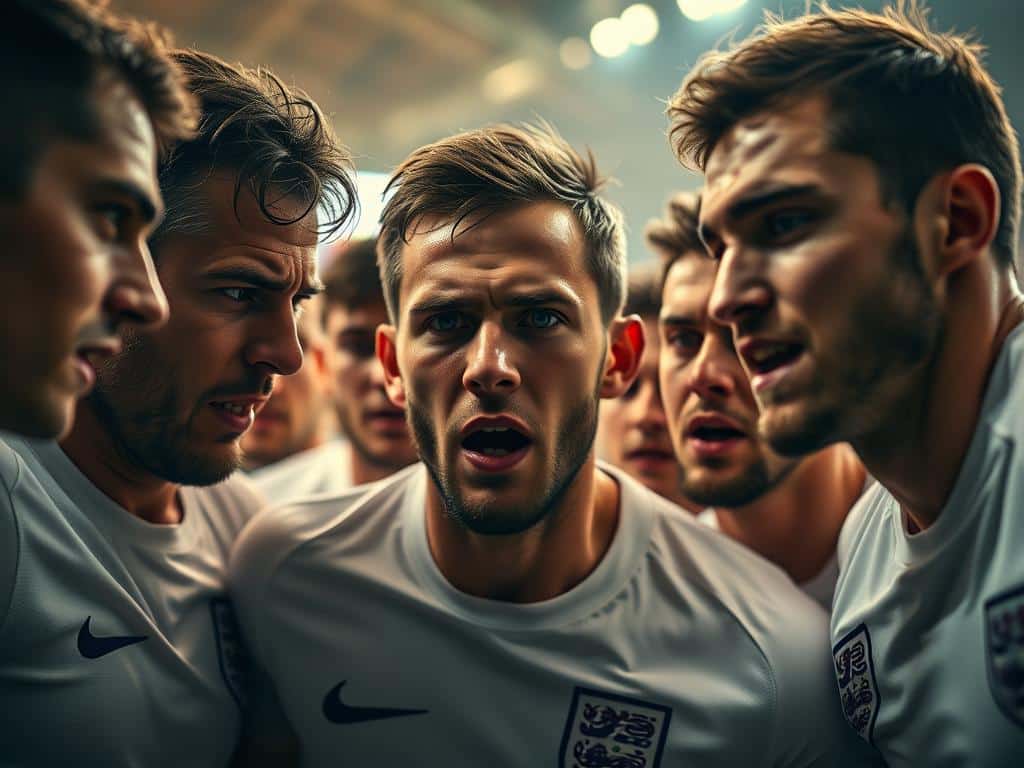
First Final Since 1966
Raheem Sterling’s darting runs terrorized defenses throughout the tournament. His semifinal penalty against Denmark sealed England’s spot in the final, ending decades of near-misses.
Southgate’s tactical flexibility stunned opponents. He switched between 3-4-3 and 5-2-3 formations, using Luke Shaw’s overlapping sprints to create chances. The left-back’s early goal in the final sent Wembley into chaos.
Penalty Shootout Loss to Italy
After 1-1 in extra time, the match went to spot-kicks. Three young stars—Saka, Rashford, and Sancho—stepped up under crushing pressure. Italy’s goalkeeper guessed right each time, dashing England’s dreams.
The penalty shoot-out loss sparked debates about player welfare and racial abuse. Yet the team’s unity during adversity won global respect.
Key takeaways from England’s historic run:
- Sterling’s dominance: 3 goals, 1 assist, and 12 dribbles past defenders
- Tactical mastery: Southgate’s formation shifts neutralized Germany’s attack
- Cultural impact: “Sweet Caroline” became the unofficial tournament anthem
- Youth development: Saka’s rise despite penalty miss showed squad depth
The England national team proved they could compete with Europe’s best. Though the trophy slipped away, this campaign redefined what’s possible for the Three Lions.
2022 World Cup and Euro 2024: The New Era
A new chapter unfolded for the Three Lions in the 2020s, blending heartbreak with hope. Fresh faces like Jude Bellingham joined veterans like Harry Kane, creating a squad capable of thrilling runs. Their journey through the world cup and euro 2024 proved this generation could challenge any team.
2022: Kane’s Missed Penalty Against France
Picture this: England trailing 2-1 to France in Qatar’s quarter-final. Harry Kane, already scoring one penalty, steps up again in the 84th minute. His shot sails over the bar—a moment that haunts fans despite his record 53 goals.
Southgate’s back-three system neutralized Mbappé’s speed but couldn’t overcome Giroud’s header. This tactical shift from 4-3-3 showed adaptability, though critics questioned starting Sterling over Foden.
Euro 2024: Back-to-Back Finals
Two years later, England became the first nation to reach consecutive euro 2024 finals. Bellingham’s bicycle kick against Slovakia went viral, while Kobbie Mainoo’s composure in midfield stunned pundits.
Key factors in their success:
- Southgate’s 3-4-3 hybrid allowing Trippier to overlap
- Bellingham’s transformation into a complete midfielder
- Mainoo’s breakout performances at just 19
The final against Spain tested England’s resilience. Despite Saka’s equalizer, fatigue from extra time matches showed. Though they fell short, this squad proved they belong among Europe’s elite since 1966.
England’s European Championship Journey
The Three Lions’ quest for European glory has been a rollercoaster of near-misses and breakthroughs. While World Cups grab headlines, the UEFA European Championship reveals their tactical evolution. From debut heartbreak to recent consistency, this tournament mirrors their growth.
1968: Learning the Hard Way
England’s first time at the Euros showed promise but ended with lessons. After topping qualification over Scotland, they fell 1-0 to Yugoslavia in the semis. A 2-0 third-place win against the USSR proved they belonged.
1996: When Football Came Home
Hosting the European Championship ignited national passion. Alan Shearer’s five goals led the charge, including that iconic volley against the Netherlands. The England team played with swagger until Germany’s penalties broke hearts.
Terry Venables’ 4-4-2 formation maximized Gazza’s creativity and Shearer’s finishing. Compared to Southgate’s 2021 approach, Venables took more risks with overlapping fullbacks. Both campaigns united fans but fell just short.
2020-2024: Breaking the Cycle
Recent tournaments show newfound consistency. Harry Kane matched Rooney’s scoring record in 2024, while Foden’s dribbling terrorized defenses. The left-side combo of Shaw and Grealish created 12 chances in 2021 alone.
Why do Euros triumphs elude England? Three key factors:
- Penalty shootout struggles (lost 4 of 5)
- Inability to control semifinal tempo
- Late tournament fatigue from physical style
Yet with Southgate’s stability and young stars emerging, the wait might soon end. The Euros remain England’s ultimate proving ground.
Key Players in England National Soccer Team Major Tournaments
Every generation produces stars who define an era with unforgettable moments. From World Cup legends to modern record-breakers, these players carried the national football hopes on their shoulders. Their goals, saves, and leadership wrote history.
Bobby Charlton and Geoff Hurst: 1966 Legends
Picture this: Charlton’s elegant runs and Hurst’s hat-trick under Wembley’s lights. Charlton’s 49 goals in 106 caps set the standard since 1966. His partnership with Hurst blended creativity with ruthless finishing.
Hurst remains the only player with a World Cup final hat-trick. His controversial second goal against West Germany changed everything. Meanwhile, Gordon Banks’ save against Pelé in 1970 showed world-class reflexes.
Gary Lineker: World Cup Golden Boot Winner
Lineker’s 10 World Cup goals rank second among Englishmen. His 1986 hat-trick against Poland showcased clinical finishing. The striker never received a yellow card—proof that fair play wins too.
Harry Kane: Record-Breaking Scorer
The England team captain rewrote history books with 69 goals. Harry Kane transformed penalties into art—scoring 21 from 23 attempts. His partnership with Bellingham mirrors Charlton-Hurst’s synergy.
Modern stars continue the legacy:
- Jude Bellingham: Midfield dominance at just 20
- Bukayo Saka: Dribbling wizard with 11 goals
- Declan Rice: Defensive anchor with 50+ caps
Iconic Managers Who Shaped England’s Tournament History
Great managers don’t just coach—they redefine what’s possible for their squads. England’s journey in national football has been guided by tactical masterminds who turned near-misses into milestones. Let’s dive into three legends who transformed the England team.
Alf Ramsey: The 1966 Mastermind
Picture this: Ramsey scrapping wingers for a revolutionary 4-3-3. His “Wingless Wonders” stunned West Germany in the final. With a 69% win rate, he proved man-management mattered as much as tactics.
Ramsey’s secret? Ruthless focus. He dropped fan favorites for players who fit his system. His prediction of a 1966 win wasn’t arrogance—it was preparation meeting opportunity.
Bobby Robson: 1990’s Tactical Brilliance
Robson took flak for using a sweeper at Italia ’90. But his 3-5-2 outsmarted Cameroon and Belgium. Paul Gascoigne’s tears masked Robson’s genius: adapting mid-tournament.
His 1986 and 1990 runs showed national football could compete globally. Even in defeat, his squad played with flair—a rarity for England then.
Gareth Southgate: Modernizing the Three Lions
Southgate’s 14 tournament wins are a record. But his real win? Changing the culture. From waistcoats to penalty prep, he made the England national side relatable.
His 3-4-3 hybrid at Euro 2024 blended youth (Bellingham) and experience (Kane). Critics called him cautious, but back-to-back finals silenced doubters.
Foreign Influence: Eriksson vs. Capello
Fabio Capello brought discipline but clashed with England’s relaxed style. Eriksson’s “Golden Generation” played beautiful football—yet both fell in quarter-finals.
Key lessons from 60 years of tactics:
- Ramsey: Systems over stars
- Robson: Adapt or fail
- Southgate: Culture wins
Memorable Matches and Defining Moments
Some matches become legends—not just for the scoreline, but for the stories they create. The Three Lions have played thousands of games, but a few stand out for their drama, stakes, and sheer unforgettable energy. Let’s relive three that shaped history.
1966 World Cup Final: England vs. West Germany
Picture this: Wembley Stadium, July 30, 1966. The FIFA World Cup final against West Germany was tied 2-2 in extra time. Geoff Hurst’s shot hit the crossbar—did it cross the line? The controversial goal stood, sealing his hat-trick and a 4-2 win.
That match wasn’t just about trophies. It changed how fans celebrated, how kids played, and even how referees used technology later. Hurst’s third goal, a thunderous strike, remains iconic.
1990 Semi-Final: Gazza’s Tears
Italia ’90 was heartbreak in penalty kicks. After a 1-1 draw with West Germany, Paul Gascoigne’s yellow card ruled him out of the final. His tears humanized the squad, making him an instant legend.
Key moments:
- First shootout loss for England in a world cup.
- Gary Lineker’s equalizer forced extra time.
- Fans adopted “Three Lions” as an anthem afterward.
2021 Euro Final: Coming Home?
Fifty-five years after 1966, England reached another final. Luke Shaw’s early goal against Italy sent Wembley into chaos. But extra time led to penalties—and another cruel loss (3-2).
Why it mattered:
- Young stars like Saka and Grealish symbolized hope.
- Southgate’s leadership rebuilt fan connection.
- The “coming home” dream lives on.
These matches prove football isn’t just a game. It’s about moments that unite generations.
What’s Next for England in International Soccer?
2026 could be the year the squad finally breaks their long-standing drought. With the World Cup hosted across the U.S., Canada, and Mexico, the stage is set for a fresh campaign. New manager Thomas Tuchel’s tactical tweaks might unlock the potential of rising stars like Kobbie Mainoo and Cole Palmer.
The UEFA European Championship in 2024 showed promise, and the Nations League offers another chance to test depth. Fans dream of football “coming home,” but it’ll take grit, youth development, and smart leadership to turn hope into history.

